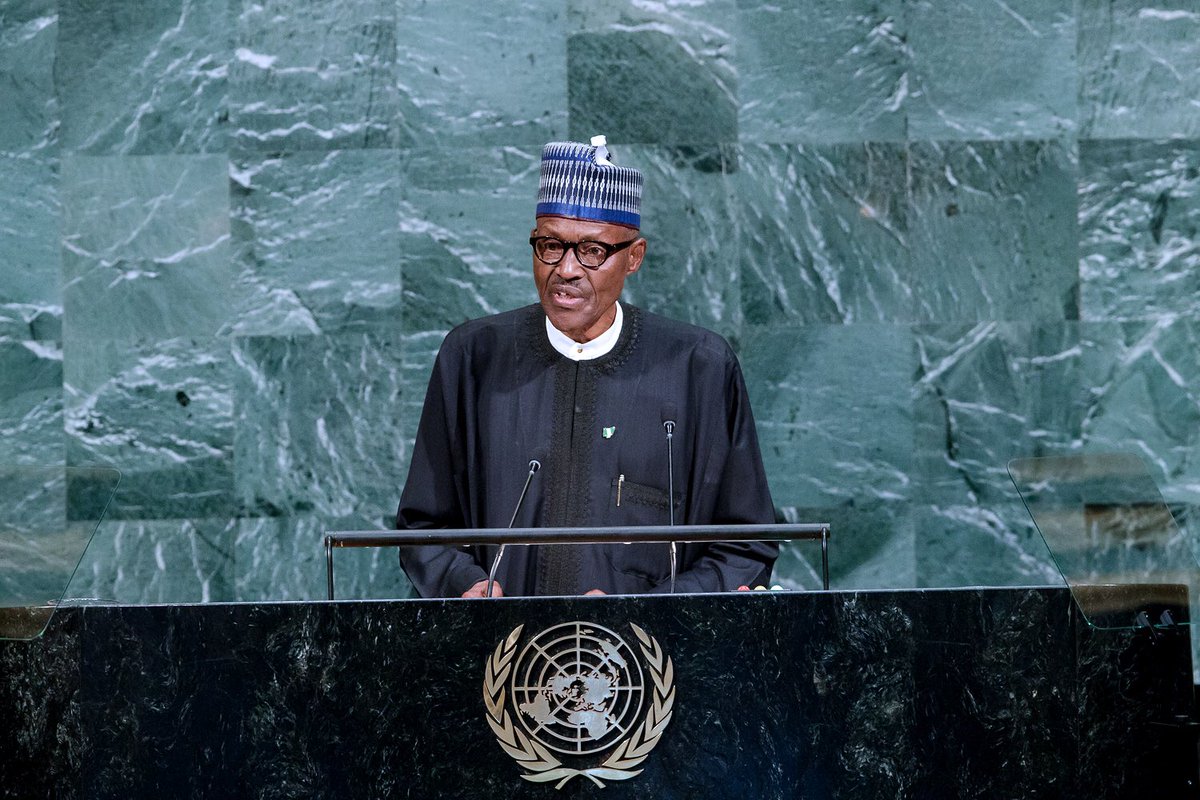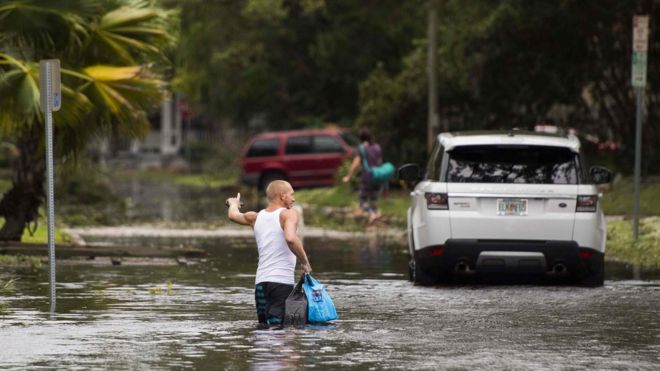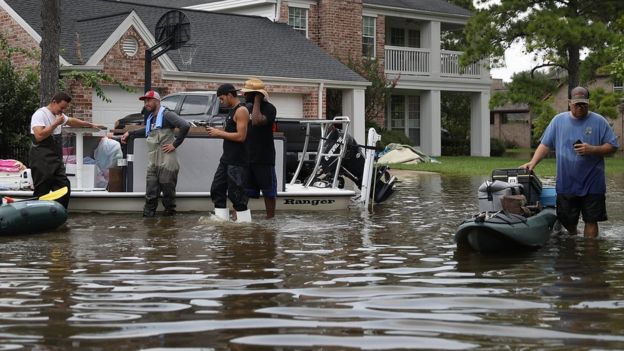
STATEMENT DELIVERED BY HIS EXCELLENCY MUHAMMADU
BUHARI,
PRESIDENT OF THE FEDERAL REPUBLIC OF NIGERIA, AT THE GENERAL DEBATE OF THE 72ND SESSION OF UNITED NATIONS GENERAL ASSEMBLY, IN NEW YORK, ON TUESDAY, 19 SEPTEMBER 2017
PRESIDENT OF THE FEDERAL REPUBLIC OF NIGERIA, AT THE GENERAL DEBATE OF THE 72ND SESSION OF UNITED NATIONS GENERAL ASSEMBLY, IN NEW YORK, ON TUESDAY, 19 SEPTEMBER 2017
Mr.
President,
Fellow
Heads of State and Government,
Mr.
Secretary-General,
Distinguished
Delegates,
Ladies
and Gentlemen,
On
behalf of my country, Nigeria, I congratulate you Mr. President on your
election and Mr. Gutteres on his first General Assembly outing as our
Secretary-General.
I
assure you both of my country’s solidarity and cooperation. You will indeed
need the cooperation of all member States as we are meeting during
extra-ordinarily troubled and dangerous times.
Let
me also thank former Secretary-General Mr. Ban ki Moon for his service to the
United Nations and wish him peaceful retirement.
Mr.
President,
2.
The previous year has witnessed many far-reaching developments. Some of the
most significant events include the Iran Nuclear Deal, the Paris Climate Change
Agreement and, of grave concern, the North Korean nuclear crisis.
Mr.
President,
3.
I must also commend the UN’s role in helping to settle thousands of innocent
civilians caught in the conflicts in Syria, Iraq and Afghanistan. In
particular, we must collectively thank the Government of the Federal Republic
of Germany under the commendable leadership of Chancellor Angela Merkel and the
Governments of Italy, Greece and Turkey for assisting hundreds of thousands of
refugees.

4.
In an exemplary show of solidarity, the international community came together
within my own region to assist the countries and communities in the Sahel and
the Lake Chad regions to contain the threats posed by Al Qaida and Boko Haram.
5.
We thank the Security Council for visiting the countries of the Lake Chad Basin
to assess the security situation and humanitarian needs, and for pledging
assistance to rebuild lives and livelihoods. Indeed, in Nigeria we are
providing relief and humanitarian assistance to millions in internally
displaced camps and those afflicted by terrorism, drought, floods and other
natural disasters.
6.
In the last year, the international community came together to focus on the
need for gender equality, youth empowerment, social inclusion, and the
promotion of education, creativity and innovation. The frontiers of good
governance, democracy including holding free and fair elections, and
enthronement of the rule of law are expanding everywhere, especially in Africa.
7.
Our faith in democracy remains firm and unshaken. Our regional organisation
ECOWAS came together to uphold democratic principles in The Gambia – as we had
done previously in Cote D’Ivoire.
8.
Through our individual national efforts, state institutions are being
strengthened to promote accountability, and to combat corruption and asset
recovery. These can only be achieved through the international community
cooperating and providing critical assistance and material support. We shall
also cooperate in addressing the growing transnational crimes such as forced
labour, modern day slavery, human trafficking and cybercrime.
Mr.
President,
9.
These cooperative efforts should be sustained. We must collectively devise
strategies and mobilise the required responses to stop fleeing ISIS fighters
from mutating and infiltrating into the Sahel and the Lake Chad Basin, where
there are insufficient resources and response capacity is weak.
10.
This will require strong UN cooperation with regional organisations, such as
the African Union, in conflict prevention and management. The UN should
continue to take primary leadership of the maintenance of international peace
and security by providing, in a predictable and sustainable manner, adequate
funding and other enablers to regional initiatives and peacekeeping operations
authorized by the Security Council.
Mr.
President,
11.
New conflicts should not make us lose focus on ongoing unresolved old
conflicts. For example, several UN Security Council Resolutions from 1967 on
the Middle East crisis remain unimplemented. Meanwhile, the suffering of the
Palestinian people and the blockade of Gaza continue.
12.
Additionally, we are now confronted by the desperate human rights and
humanitarian situations in Yemen and most tragically in the Rakhine State of Myanmar.
The Myanmar crisis is very reminiscent of what happened in Bosnia in 1995 and
in Rwanda in 1994.
13.
The international community cannot remain silent and not condemn the horrendous
suffering caused by what, from all indications is a state-backed programme of
brutal depopulation of the Rohingya inhabited areas in Myanmar on the bases of
ethnicity and religion. We fully endorse the call by the Secretary-General on
the Government of Myanmar to order a halt to the ongoing ethnic cleansing and
ensure the safe return of the displaced Rohingya to their homes in safety and
dignity.
14.
In all these crises, the primary victims are the people, the most vulnerable
being women and children. That is why the theme of this session: Focusing on
People: Striving for Peace and Decent Life for All on a Sustainable
Planet" is most apposite.
15.
While the international community grapples to resolve these conflicts, we must
be mindful and focus on the widening inequalities within societies, and the gap
between the rich and the poor nations. These inequalities and gaps are part of
the underlining root causes of competition for resources, frustration and anger
leading to spiralling instability.
16.
The most pressing threat to international peace and security today is the accelerated
nuclear weapons development programme by North Korea. Since the Cuban missile
crisis of 1962, we have never come so close to the threat of nuclear war as we
have now.
17.
All necessary pressure and diplomatic efforts must be brought to bear on North
Korea to accept peaceful resolution of the crisis. As Hiroshima and Nagasaki
painfully remind us, if we fail, the catastrophic and devastating human loss
and environmental degradation cannot be imagined.
Mr.
President,
18.
Nigeria proposes a strong UN delegation to urgently engage the North Korean
Leader. The delegation, led by the Security Council, should include members
from all the regions.
19.
The crisis in the Korean peninsula underscores the urgency for all member
states, guided by the spirit of enthroning a safer and more peaceful world, to
ratify without delay the Treaty prohibiting nuclear weapons, which will be open
for signature here tomorrow.
Mr.
President,
20.
I end my remarks by reiterating Nigeria’s abiding commitment to the
foundational principles and goals of the United Nations. Since our admission as
a member state in 1960, we have always participated in all efforts to bring
about global peace, security and development. Nigeria will continue to support
the UN in all its efforts, including the attainment of the 2030 Agenda














